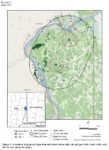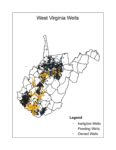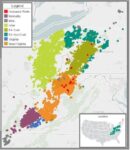February 21, 2016
Legislature Adds Insult to Injury with Bills to Aid Drillers
It was bad enough that the Legislature and Governor Tomblin included few protections for surface owners in the Horizontal Well Act when the state finally updated antiquated drilling laws in 2011. Instead, the Legislature included an arbitrary setback of 625 feet from the center of the pad in the Act. They also required the DEP to do studies and gave the agency the authority to do rule-making if the studies showed additional protections were needed.
DEP contracted with the WVU School of Public Health to conduct a study on noise, light, dust and volatile organic compounds (VOCs) as they relate to the distance wells can be from peoples’ homes. Based on the study’s findings, DEP reported back to the Legislature saying that action needed to be taken “to reduce potential exposures” and “to provide for a more consistent and protective safeguard for residents in affected areas.” Instead of doing rule-making, the DEP asked the Legislature to revisit how close well sites can be to peoples’ homes, suggesting the limit from occupied dwellings be measured from the limit of disturbance (edge of the pad) rather than the center.
It’s been nearly three years since the study’s findings and recommendations were published, but neither the DEP nor the Legislature has taken any action to implement them. To add insult to injury, the Legislature is attempting to further erode the limited rights surface owners have and eliminate laws that surface owners and others living with oil and gas drilling in their communities are using to seek relief from drilling related impacts that are not regulated by the DEP.
The most egregious of these proposals is SB 508, which would take away citizens’ ability to bring “nuisance” suits against against oil and gas drillers or others who engage in activities that harm their property values or interfere with the enjoyment and use of their property. On Thursday, the Senate Judiciary Committee approved the bill and it is scheduled to voted on by the full Senate on Tuesday. The only audible “No” vote against the bill was Senator Mike Romano (D-Harrison).
Although much of the discussion around the bill has focused on oil and gas drilling, the effects of SB 508 are not limited to suits over oil and gas related activities. As the Charleston Gazette-Mail reported, the bill gives businesses virtual immunity from nuisance suits as long as the business does not violate a law, regulation or the terms of their license or permit. Drillers and other businesses could use this “permit shield” as a defense, even if the activity causing the nuisance isn’t covered or regulated under the license or permit.
If SB 508 passes, property owners would be left with no legal recourse to hold irresponsible neighbors accountable for their actions. We can’t let the Legislature take this right away.
Click here to contact your Senators and tell them to oppose SB 508. The West Virginia Association for Justice has also created a page to easily to contact your legislators again and urge them to vote NO on SB 508.
Unfortunately, the insults don’t stop there. The same day the Senate Judiciary Committee passed SB 508, the Senate Committee on Energy, Industry, and Mining approved a bill, SB 565, which would allow drillers to build well pads and access roads on a surface owner’s land without getting a well work permit. Instead, drillers would apply to build the pad and roads under a general water pollution control permit for oil and gas related construction activities issued by the DEP Division of Water and Waste Management (DWWM).
Although this may give some folks comfort because the DWWM has been more aggressive about issuing Notice of Violation to drillers when there activities impact waters of the state, there are a couple of problems with this approach. First, Stormwater Pollution Prevention Plans (SWPPPs) are not engineer approved, or subject to an engineering review by the DEP. SWPPPs are only intended to control sediment and DWWM only reviews the plans for how well they will keep sediment from the construction site from entering rivers and streams. Second, the stormwater permit is only in effect during construction. This means if the pad or access roads are poorly built and problems arise after construction is complete, and the driller has not yet applied for and received a well work permit, the DEP may be left with no way to make the driller correct these problems.
In addition to the regulatory loopholes created by SB 565 is bad for mineral owners because it would allow drillers to extend and hold some leases that might otherwise expire simply by building a well pad with no a guarantee that they will actually drill a well.
Just when we thought the week couldn’t get any worse, on Saturday, the House Energy Committee approved a bill would allow drillers to lease jointly owned or heirship mineral tracts if a simple majority of owners agree to sign – changing existing common law that currently requires all owners with an interest in tract to sign before a company can execute a lease. (Read more here.)
Our biggest concern with the bill, as our co-founder and attorney Dave McMahon told members of the committee, is that there are many surface owners who only control a small portion of the minerals under their property. HB 4639 would allow the wishes of those surface owners to be ignored if a little more than 50 percent of their co-owners in the mineral tract make a deal with the gas company. For years, SORO has advised surface owners to buy an interest in the minerals under their property if they want to have a say in how the minerals and their surface property are developed. HB 4639 would largely eliminate any leverage surface owners with partial ownership of the minerals have in negotiations with gas companies. (See statement below from the WV Royalty Owners Association for more information on why this bill and its Senate companion SB 646 are bad for both surface and mineral owners.)
Please contact your Senators and Delegate(s) and urge them to oppose these terrible bills.
Thank you for taking action. We’ll continue to keep you posted.
WV Royalty Owners Association statement on HB 4639;
WVROA Opposes New Forced Pooling Bill
The new forced pooling bill, HB 4639 is a shameful attempt to steal the property rights of West Virginians. In a highly unusual move it was originated in the House Energy Committee and passed to House floor on a Saturday morning. The gas companies have abandoned the stakeholder’s process and are trying to pass this bill before people have time to even know what it is. 4639 revises the co-tenancy law of our state to say that if a simple majority of co-tenants agree to a lease, that the gas company can drill and pay the majority co-tenants that agreed to lease. The practical reality is the landmen only have to get a simple majority of owners to sign and then they are done. The un-leased co-tenets that are forced in cannot sue the company, and it is up to them to get the majority to pay them their share minus deductions. This isn’t just forced pooling, this is forced pooling on steroids. Last year some of the same sponsors of this bill were concerned that force pooling would force 20 percent to lease, this bill forces 49.9 percent to lease with no prohibition of deductions, no depth or target formation limitations, no surface protection, and no recourse against the driller. HB 4639 eliminates any due process for non-consenting minority owners and cripples the ability of anyone but majority owners to negotiate a lease.
Forced pooling is a controversial topic to say the least. From the perspective of the West Virginia Royalty Owner’s Association, a forced pooling bill that does not protect good faith negotiations and have adequate protections for property owners, mineral and surface owner alike, is nothing more than stealing. Rather than maintain a commitment to fairness and property rights, the legislature has decided to rename forced pooling “co-tenancy reform” and give away our property rights and take money from our pockets all to benefit massive out of state corporations. WVROA supports the stakeholder compromise forced pooling bill that protects West Virginia Surface and Mineral owners and opposes the legalized thievery of HB 4639. Rather than maintain a commitment to fairness and property rights, the legislature has decided to rename forced pooling “co-tenancy reform” and give away our property rights and take money from our pockets all to benefit massive out of state corporations.












